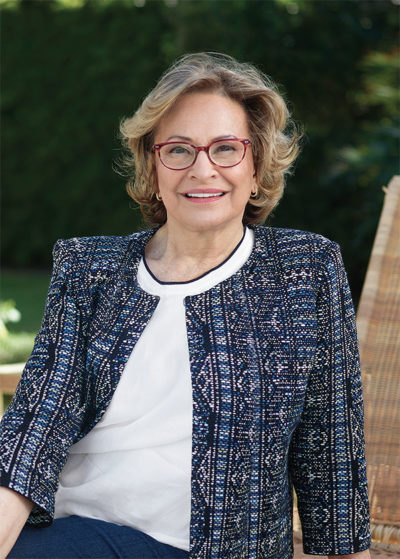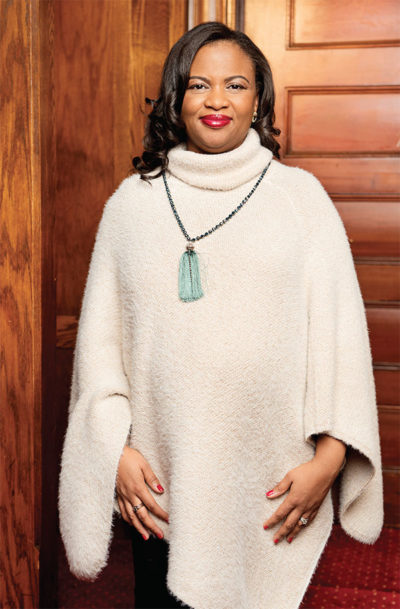
At first glance, the idea of a business school partnering with a medical foundation seems a bit unusual.
Dr. Mack Cheney certainly felt so, at least initially. He’s a co-founder of the Steven C. and Carmella R. Kletjian Foundation, which strives to improve the safety, affordability, and quality of surgery in the world’s poorest places. The work of the organization is vital. According to The Lancet Commission on Global Surgery, a staggering 5 billion people do not have access to safe and affordable surgical and anesthesia care.
Cheney co-founded the Kletjian Foundation with Carmella Kletjian, a member of Babson’s Board of Trustees, and she pushed for the Boston-based organization to work with the College. “It was very insightful and visionary that she took this approach. I didn’t understand it at first,” admits Cheney, a professor at Harvard Medical School. “I remember thinking, why would we partner with an entrepreneurial school?”
The unlikely partnership still puzzles many clinicians whom Cheney knows. “A lot of my surgical friends,” he says, “shake their heads and say, ‘Why would you do that?’” But setting up surgical care in a developing country is a complicated endeavor, requiring far more than medical expertise. Innovative approaches to business, leadership, and entrepreneurship also are necessities. With Babson’s expertise, the foundation aims to establish surgical care that is self-sufficient, sustainable, and not dependent on the outside help of clinician volunteers, who typically travel to developing countries to perform care but soon depart.
“We need more than the old way of parachuting in and then leaving,” says Kletjian. “It isn’t sustainable. We need to build an ecosystem. Having surgery, running hospitals—it’s a business. We need to teach others how to do it.”

Photo: Jeffery Salter
Carmella Kletjian, Babson trustee and co-founder of the Steven C. and Carmella R. Kletjian Foundation
People Dying Unnecessarily
The Kletjian Foundation has made a significant investment in Babson. It not only has established an endowed Distinguished Professor in Global Surgery (a position it hopes will be filled this year), but also funded the Schlesinger Fund for Global Healthcare Entrepreneurship, a multifaceted initiative housed within The Lewis Institute that’s involved in research, student programs, and educational activities.
Kletjian long has known about the strengths of Babson. Her late husband, Steven Kletjian, attended the College, leaving before graduating to take over the family maintenance business after his father had passed away in 1969. Steven Kletjian grew that business, Unicco Facility Management, from about 55 employees when he took over to more than 18,000 when he sold the company in 2007. He passed away that same year.
Carmella Kletjian started the foundation in 2012 with Cheney and John Freeman, the former president and managing director of investment firm Quabbin Capital. Kletjian’s interest in medicine stems from her 30-year career as a surgical nurse anesthetist. “I was a nurse for most of my life,” she says. Through her work, she met Cheney and other clinicians who went on medical missions and soon came to realize what a tremendous unmet need exists for surgical care around the world. “You go in some countries, and they have to walk miles to get care,” Kletjian says.
In his 30 years of delivering care in developing countries such as Guatemala, Haiti, Ecuador, and Kenya, Cheney has seen this need firsthand. “People are dying unnecessarily,” says the otolaryngologist. “People are dying of benign disease.” Basic surgical care could make a major difference. A patient in a developing country may have a benign growth on his face, for instance, that he can’t have removed because there are no surgeons in the area. “When the lesion is neglected, it becomes life-threatening,” Cheney says. “If the same patient had lived in Boston, it would have been a small growth an oral surgeon would have removed.” Cesarean sections are another example of commonplace procedures that are desperately needed in some developing countries. “The mortality rate during childbirth in many developing countries is staggering,” Cheney says. “If C-sections are available, mortality rates for both mother and child go down.”
The Kletjian Foundation offers surgical training to local clinicians, but performing surgery in these poor places is much more complicated than, say, running a health clinic that gives vaccinations. “You can run that out of a garage if you have the vaccines,” Cheney says. Surgeons in a developing country are confronted with questions such as does the facility have reliable electricity and clean water? Do the instruments work? Does it have a steady supply of oxygen? Clinicians also must consider what kind of access to care their patients have, how they will pay for services, and if they have insurance.
For help addressing core questions of infrastructure, supplies, and access—the very issues that will determine whether surgical care in a developing country remains sustainable—the Kletjian Foundation has turned to Babson. Although the foundation has a number of partner institutions, including Harvard Medical School, Boston-based teaching hospitals, and the World Health Organization, the group’s only nonmedical affiliate is the College. The foundation encourages its partners to meet and collaborate, and Babson brings a pivotal business and entrepreneurial point of view. “If we just had a room full of surgeons, there would be very little divergence of opinion,” Cheney says.

Photo: Webb Chappell
Wiljeana Glover, faculty director of the Schlesinger Fund for Global Healthcare Entrepreneurship
Babson’s Role
To understand more fully how Babson is having an impact on medical care, consider the work of the Schlesinger Fund for Global Healthcare Entrepreneurship. Supported by the Kletjian Foundation and named after former Babson President Len Schlesinger, the fund was founded in 2013 and since then has organized a number of programs that, at their heart, explore the role of entrepreneurship in global health.
Providing study-abroad opportunities for Babson students is one of its objectives, says Wiljeana Glover, faculty director for the Schlesinger Fund. For example, a fellowship has sent MBA students to Uganda to help in an accelerator focused on medical devices and technology. Teams in the accelerator are developing a variety of helpful products, from a locally produced hand sanitizer to a telehealth platform offering support for midwives by connecting them with doctors. “We’ve been able to infuse ET&A thinking into the way they’re approaching things,” says Glover, an assistant professor of technology and operations management.
The Schlesinger Fund also brings experts and entrepreneurs to campus for its Disrupting Global Health Seminar Series. One memorable session, says Glover, involved Dr. Mahmoud Hariri, a surgeon from war-torn Syria. “He was talking about how they’re taking care of people in the middle of a war, and how they’ve created hospitals underground,” Glover says. Case studies and research are another priority of the Schlesinger Fund. One of its cases examined how a doctor working in Uganda was able to develop an alternative, low-cost treatment for hydrocephalus (sometimes called “water on the brain”). Another case study in Uganda looked at how a hospital was implementing an electronic database of patient information that potentially could be rolled out to low-resource areas across the country.
Glover found the innovative and entrepreneurial actions of the clinicians in these cases to be striking. “Some of the doctors might have been creating new products; others might have been creating new processes. They taught us a lot about seeing entrepreneurial leadership in places we weren’t necessarily expecting it,” she says. “Very few, if any of the cases, were driven by folks with MBAs. These are clinicians who have just figured this out on the ground.”
Glover wonders what could be achieved if more clinicians, especially those in the developing world, were exposed to these sorts of skills. If doctors were trained regularly in entrepreneurship, leadership, and business, could they accomplish even more innovation? “If this is what it takes to move the needle on global surgery and global health, then how do we train people in this?” Glover says. “We have to think about workforce training beyond surgical skills. If we’re going to be innovative, we need to think about entrepreneurial opportunities. Surgeons will have to create new models of care. They’ll have to open up their own clinics. They’ll have to develop some new product or service.”
The Schlesinger Fund will begin to test the possibilities of entrepreneurial training. A program focused on Haiti that’s currently in the planning stages will provide education for doctors and other stakeholders such as insurers and suppliers. Glover says the country already has many clinicians who improvise and innovate, but this program, with training sessions to be held potentially at Babson and in Haiti, is designed to amplify those actions. “We’re coming in and saying, how can we make that systemic?” she says. “How do we build that into the way that we’re thinking about medical training?”
With Babson providing valuable expertise, the Kletjian Foundation’s ultimate goal is sustainability. It has worked in Uganda, Haiti, and Ecuador and is looking at Peru in the future, but eventually the foundation expects its help won’t be needed in any of these places. As Cheney says, “We’ll just be sending holiday cards back and forth.”
The implications of such sustainability could be far-reaching, notes Kletjian. Surgical facilities that are sound and safe will bring not only better health outcomes but also much-needed jobs, from doctors and nurses to lab technicians to administrative assistants and more. “Ideally, we’re building an economic engine,” Kletjian says. “I get very excited about this.”
